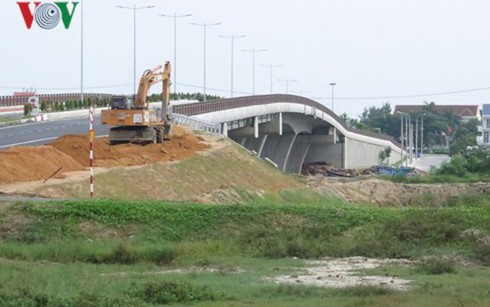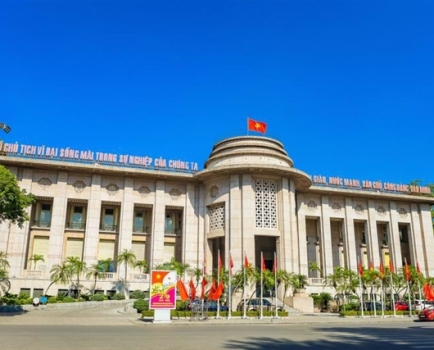Minister identifies obstacles in build-transfer projects
Sat, 01 Jun 2019 19:20:00 | Print | Email Share:
VOV.VN - Minister of Finance Dinh Tien Dung has claimed that the value of land areas used as payment for build-transfer investors stands much higher than that of the implemented projects.

De Vong BT project in the central province of Quang Nam. (Illustrative photo: VOV)
Minister Dung made the statement during the ongoing seventh session of the 14th National Assembly (NA) which took place in Hanoi on May 31.
He added that the issuance of a decree on the use of public assets as payment for build-transfer (BT) project investors raises questions on how to harmonize the interests of both the State and investors, as well as overcome shortcomings relating to the implementation of BT projects.
The Government has mulled over a number of relevant issues with a hope of ensuring strict compliance with laws and handling any problems that arise, the minister noted.
He pointed out three key challenges to the use of public assets as payment for BT investors.
The first obstacle is to guarantee price parity as mentioned in the Law on Management and Use of Public Assets. In fact, a number of BT contracts had been signed prior to the law taking effect, thus leading to a failure to secure price parity. As a result, the value of land areas approved as payment for BT investors is much higher than that of BT projects. This becomes a major challenge when it comes to handling the parity issue in accordance with the decree.
Secondly, a number of shortcomings exist when simultaneously carrying out the bidding of BT projects and the auctioning of land use rights in accordance with current laws.
The Law on Investment stipulates that the value of BT projects and the selection of BT investors must be defined in line with the Law on Bidding.
Meanwhile, current legal regulations on land management requires an auction for the land used to implement real estate projects.
However, these regulations become inapplicable to BT projects as the State plays the role of buyer and investors act as sellers during the bidding process. By contrast, at public asset auctions, the state becomes the seller and investors play the role of the buyers. It is worthy of note that current laws do not allow bidding and auctioning public assets at the same price.
Pricing the land areas used as payment for BT investors also presents another challenge. Dung stated that the calculation of land prices for BT investors have run into many inadequacies in the past time, with many failing to meet legal regulations and market rules.
According to the National Assembly’s report on the implementation of BT projects, there are currently 22 localities implementing projects under this investment form.
Most BT investors have been selected through contractor designation. Furthermore, the use rights of land areas used as payment for BT investors have yet to be auctioned according to the Land Law, thus resulting in losses for the State budget.
In a report sent to the National Assembly, the State Audit Office of Vietnam noted a series of inadequacies and subsequent losses seen in many BT projects.
By: VOV
---------------------------------------------
Same category News :













